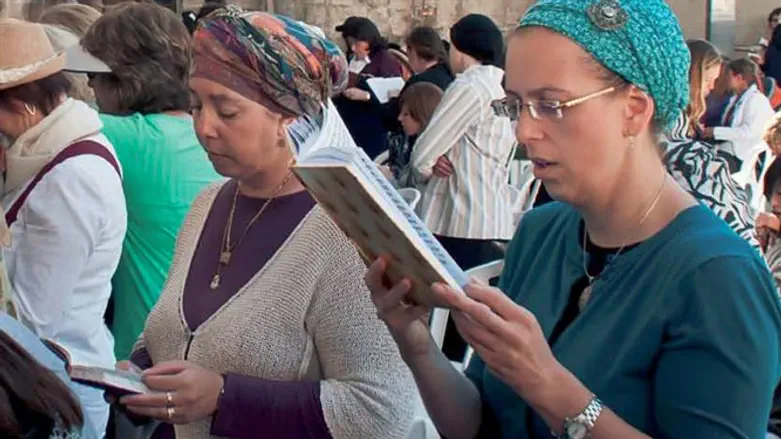
It isn't every Yom Kippur (Day of Atonement) that I think about planes and vertigo. But this year I felt like we were in moral vergito.
It began after two well-known religious women who run a Facebook group with 10,000 religious members announced hours before Yom Kippur that they divorced their husbands and were now in a mutual relationship. Their announcement was widely supported and praised by many of the religious women in the group.
The vertigo effect happens when a pilot becomes confused between heaven and earth. His gut tells him that the sky is in one place, but the plane's gears tell him the exact opposite. Those moments are critical, and if the pilot does not ignore his instincts and act according to what the plane's equipment tells him, he will crash.
From birth, we are told to honor others, not gossip, and not shame anyone in public. We try our best to educate ourselves and our children to be gentle people, and to act in a pleasant fashion. In our minds, efforts to draw someone closer to Torah must come only from love. And so the confrontation with something which diametrically opposes Jewish law and Torah ethics left me and many others confused. We do not agree, but we do not want to hurt anyone's feelings. We are terrified of what is happening to our society, but we are afraid of forbidden gossip. We feel like the rug has been pulled out from under us.
Planes have equipment to set them right, and we have a compass which is supposed to help us extricate ourselves from these types of situations: The Torah's ethics. Our Sages told us not to judge anyone until we are in his shoes, and since we will never be exactly in his shoes, we cannot judge the way someone handles his situation. But these rules change the moment private actions are boasted of in public with the intention of receiving legitimacy and public support. At that moment, the discussion ceases to deal with the person and his actions, and turns its focus to the society in which we live. And we cannot ignore the desecration of G-d's Name.
When we "like" forbidden acts, we agree with them. Our public support turns the forbidden into something permitted. Changes in how we see morals and ethics do not happen in one day. They are fed for long periods of time not only by what we do, but also by what we praise or oppose. And every voice counts.
It isn't simple. First of all, because today's generation views disagreement as rejection and as hurtful. Judgement and criticism have become absolutely forbidden, on pain of death. But it doesn't have to be this way. We can separate a person from his actions. We can praise the good he did, yet clearly express opposition to his moral compass. We can share difficult feelings with others. The right to express feelings is not reserved for one side only. Our feelings are a sign of health, a sign that we have not completely lost feeling, that we have not completely become used to this.
And there is the fear. In a discussion of the two women's announcement, those who voiced opposition were met with judgement and harsh criticism. Quotes from the Torah and Sages were quoted right and left, in order to silence the opposition. "Forbidden gossip," "love your fellow as yourself," and the Sages version of "the pot calling the kettle black" became a way to permit what is forbidden by Torah law.
The use of these quotes reminded me of an explanation I had heard previously, regarding Rashi's last comment on the Torah. Commenting on Moshe's (Moses) death, Rashi mentioned Moshe's legacy as well, discussing both the giving of the Torah and the breaking of the Tablets. I once heard Rabbi Shalom Gold say that if Moshe had not broken the Tablets on his own, those who were serving the golden calf would have snatched them from his hands and danced with them around the calf. In this instance, too, people are using the Torah to justify forbidden acts.
Following the announcement, many women spoke to me privately, telling me of sleepless nights and rivers of tears, of the difficult choice they faced between choosing to remain in the group and be supported, or choosing to follow their inner truth, the inner voice which was screaming in protest.
Unfortunately, this is not an isolated incident. The demand to be politically correct and the ease of being swept away by the trend to accept and embrace everything makes standing up for what is morally right extremely difficult - and the difficulty is constant and repeated. Faced with this conflict, each of us makes his or her choice. When we support, we choose; when we oppose, we choose; and when we are silent we also choose.
This choice requires courage, the courage to stand up for our values. It requires courage to leave our comfort zone and recognize the various ways we could respond. It requires courage to recognize that G-d's Torah is true, and though it includes "the right hand drawing closer," it also includes "the left hand pushing away," and only with both can we reach contentment. It requires courage to stand up for what is right, lest we crash in a place we really do not want to be in.
Leah Aharoni is a business coach and the founder of Women for the Wall.